Cognis Aerospace Zweistik Repulsor
Cognis Aerospace - Zweistik Repulsor
Contributed by Nick Esselman
| Manufacturer: | Cognis Aerospace |
![[Picture]](/images/archive/images/ratings/rating_cognis_repulsor.gif) (08/31/02) I was at NARAM 43 in New York and
LawnDart Rocketry had a stand there. I was able to see a number of Cognis kits
that Dale was getting ready to sell through LawnDart. Cognis Aerospace kits are
designed in Australia. So after returning home I made contact with LawnDart to
see when these kits would be available. Once available I order several of them;
the Lunar Lander, the Gnat, and this one: the Zweistik Repulsor.
(08/31/02) I was at NARAM 43 in New York and
LawnDart Rocketry had a stand there. I was able to see a number of Cognis kits
that Dale was getting ready to sell through LawnDart. Cognis Aerospace kits are
designed in Australia. So after returning home I made contact with LawnDart to
see when these kits would be available. Once available I order several of them;
the Lunar Lander, the Gnat, and this one: the Zweistik Repulsor.
I didn't purchase the Repulsor because I had any historical knowledge, however according to LawnDart's page there is some. "Soon after Robert Goddard launched the world's first liquid fuelled rocket, the Germans were in hot pursuit. This semi-scale Zweistik Repulsor recalls those days when a front-engined rocket was thought to be a more stable design. Fuel and oxidizer were kept in the two legs (stiks) and pressure-pumped up to the front motor.. ".
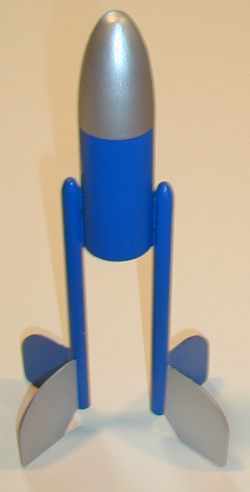 The Repulsor stands 11.75" tall and the main body is based on
a 1.6" body tube. The two legs are 10.5mm tubing. The main and two leg
nose cones are balsa. The fins are 1/16" balsa. It has an 13mm motor mount
with a thrust ring and two 1/32" centering rings. The recovery system
includes a 28" piece of Kevlar®,
a 12" piece of 3/8" white, flat elastic and a 12" Gold 1/2 mil
Metallized Polyester Sport Chute made by Aerospace Speciality Products
(includes a swivel).
The Repulsor stands 11.75" tall and the main body is based on
a 1.6" body tube. The two legs are 10.5mm tubing. The main and two leg
nose cones are balsa. The fins are 1/16" balsa. It has an 13mm motor mount
with a thrust ring and two 1/32" centering rings. The recovery system
includes a 28" piece of Kevlar®,
a 12" piece of 3/8" white, flat elastic and a 12" Gold 1/2 mil
Metallized Polyester Sport Chute made by Aerospace Speciality Products
(includes a swivel).
CONSTRUCTION:
I received one of the earliest released and LawnDart asked if I wanted to wait another month or so until the written instructions were available. I decided to accept them with just the engineering drawings. Therefore, I can not comment on the instructions, however, I will say that this is a very easy kit to build so the instructions need not be anything special.
The first part of assembly was the motor mount which was done according to the drawing with the spacing of the centering rings as shown. The Kevlar® shock tether was attached around the motor tube and passed through a small notch in the upper centering ring. This assembly was then glued into the body tube.
Next the small balsa nose cones were glued into place on the legs and then they were attached to each side of the body tube. The launch lug was placed in one of the joints between the main body and a leg.
The engineering drawings had a fin template that was used to cut out the four fins. These were then glued into place using the alignment guide on the drawing.
It should be noted that the provided nose cone is not the same shape as the drawings or the picture on LawnDart's webpage. Also, the picture on the webpage seems to show longer legs, too. Not too important to me, but for those checking it out I thought I'd share those differences.
To finish up the rocket, the metal eye-screw was screwed into the nose cone, the elastic is attached to the Kevlar® and then to the eye-screw, and lastly the parachute was assembled and attached to the nose cone eye-screw.
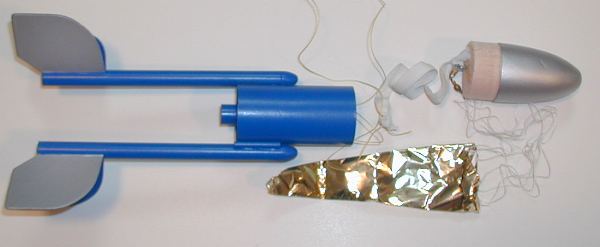
Finished. Easy.
For finishing I stuck with my basics. Plasti-Kote Primer. A touch of Bondo Glazing to get those deep grooves in the balsa nose cone. One comment on that. Balsa nose cones can take some work to finish, but the one provided with this kit really seemed to have some deep grooves in it. Regardless, I got it filled and finished. I used Krylon Navy Blue paint and Krylon Chrome paint for my own, non-authentic look.
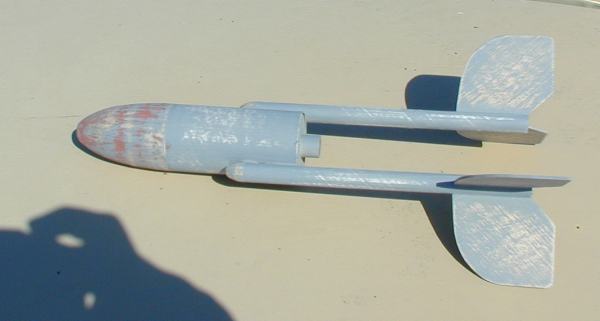
Overall, for CONSTRUCTION I would rate this kit 4 ½ points. It was easy to build, but a couple detractors are the fact that there is no motor retention and the deep grooves in the balsa nose done. On the other hand, it has an outstanding recovery system for a kit of this size and price.
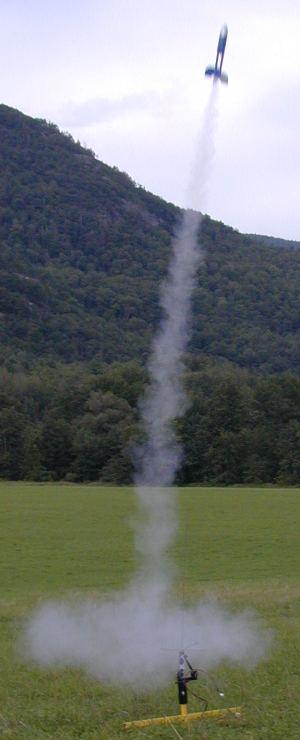 FLIGHT/RECOVERY:
FLIGHT/RECOVERY:
Cognis (LawnDart) does not have a recommended motor list (potentially it is now in the instructions) and this is not a design that can be set up in RockSim, so I simply made the decision to start with an 13mm 1/2A3-4.
To prepare the rocket for flight, wadding should be placed in the body tube. I used a Pratt Heat Shield (small). Then the parachute and shockcord needs to be fit into the rocket. Not a lot of room in there so pack carefully. It does all fit though.
Next, the motor needs to be friction fit into the mount.
The first flight lifted off on the 1/2A3-4 (captured in this photo). The altitude was low, guessing about 30 feet and therefore the delay was long. It did eject and the parachute opened at about 10 feet from the ground. So the 1/2A-2 should be a recommended motor.
For the next flight I took 1 of my last 2 Apogee A2-3's and wrapped tape at the top and mid-way points to allow it to fit into the 13mm mount snugly. The lift off was slow but it did lift it. It flew well to maybe 80-90 feet and ejected at apogee. Actually a pretty good motor to rocket match. The parachute size is good as the rocket descended nicely.
I tried to tape and install an Apogee B2-5 but in the process of putting it in the motor mount broke free of the centering rings. Probably just as well as the CG for the B2 probably would have not been good. I have since repaired the rocket's motor mount and will be seeking some Estes A10-3 motors.
I was later successful flying on an A10-3. Nice match for this kit. Then I got a bit wild and flew it on an Apogee B2-5 (pictured below). And then for an Apogee C6-4. See the flight log reports for info on those flights.
I tried to tape and install an Apogee B2-5 but in the process of putting it in the motor mount broke free of the centering rings. Probably just as well as the CG for the B2 probably would have not been good. I have since repaired the rocket's motor mount and will be seeking some Estes A10-3 motors.
For FLIGHT/RECOVERY, I would rate this kit 4 points. Not having any recommended motors and the fact that it only flies on 13mm (1/2A or A) limits the motor choices. The recovery system is great and seems to be matched to this rocket well. It was a stable flier and is unique with the forward motor mount.
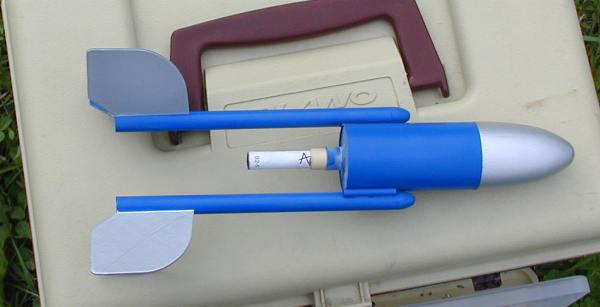
I give the kit an OVERALL rating of 4 points. It was very easy to build. For the most part, exception of balsa nose cone, the materials were adequate for the size and style of rocket. The recovery system is very nice, but I have said that. If you are looking for something different to launch with your friends I would recommend this rocket. I think there needs to be an 18mm version, but that will require an upscale because you couldn't fit the motor mount in the this size of body tube (unless the nose cone was plastic and hollow).
 |
 |